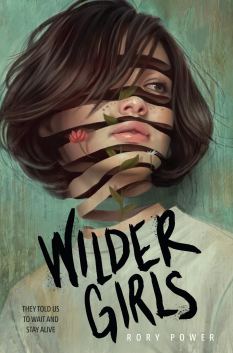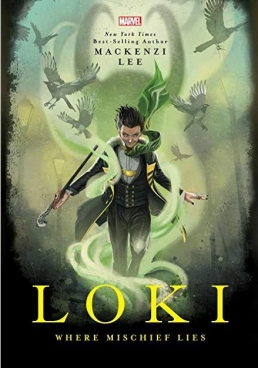
Title: Wilder Girls by Rory Power
Release Date: TODAY! July 9, 2019
Rating: 4.5 Stars
Representation includes non-labeled queer women, woman/woman relationships
Received as an Advanced Readers Copy from the American Library Association Conference.
Non-Spoiler Short Review:
Wilder Girls is a book that is hard to firmly lock in any particular genre. Technically, it is a scifi focused on a contagion, but it is deeply grounded in a way that makes it feel like it could happen here, tomorrow. It feels a little like a dystopian or zombie novel, without actually being either. It is ultimately an intense character study and an unputdownable page turner. It is not the thrills of a big battle fighting, explosion covered action story. No, the tension is in the subtle, terror rising up in the held breath of moment. The characters are wonderfully realized. Set at an all girl boarding school after a mysterious outbreak, the story focuses on the lives and sacrifices of a cast of teenage girls and the women who teach them. It is a joy to read a story entirely populated by women (there is only one man in the novel, and he is a short lived character). I truly have never read anything so exclusively and apologetically women centered. I found myself clinging to every moment. In the end, it is full of emotional weight without being bleak. I recommend this book for a thoughtful, captivating read.
Minor Spoiler Long Review (I will try to avoid major twists, but some plot points may be spoiled and overarching themes are discussed):
I grew up reading books set at boarding school and daydreaming about attending class with Jo, Blair, Natalie, and Tootie at Eastland the boarding school from Facts of Life. As the only girl among three brothers who were all homeschooled, I daydreamed about being surrounded by other girls. Since those early reads, I have not experienced a book with an almost exclusively woman cast. Picking up Wilder Girls I immediately sunk into the world of it as that old, dormant boarding school daydream reignited. The book masterfully took that nostalgia and added this horror/survival element. The charming school life became only a haunting hint at the back of the nightmare that the story focused on. That juxtaposition worked on me and I found myself unable to look away. The whole world of the Wilder Girls school, Raxter, is wonderfully realized. The hints of what used to exist linger effectively throughout the story while setting up the reality of the current plague scenario. The school and the surrounding woods grow out into its own character, with perhaps, a malicious intent.
It was fascinating to read a contained crisis story that never folded out into a global conspiracy in the way a Maze Runner or Hunger Games dystopian would. We never see the outside world, and instead focus only on the crisis at the boarding school. The world of Wilder Girls is one ravaged by climate change, the forces of adaption and entropy playing out in this small scale stage. It has an air of desperation familiar to dystopian readers, but the small scale allow it to avoid the tropes of that genre, instead humanizing the crisis in a deeply personal way.
The most powerful theme that runs through the story is also the subtlest one, the idea of unintended consequences. The words “I was just trying to help” ring throughout multiple interactions across the story, wrapping even into the mystery at the center of the Raxter crisis. It is a story that asks us to question how our actions impact others, even when they are intended for good.
Themes in mind, this is a character driven story at heart. It focuses on three friends, Hetty, Reese, and Byatt. They each have stunningly layered and complicated personalities. Their shifting dynamics with each other and the other girls and women at the school makes up the meat of the story asking how they can survive together against forces so much bigger than them.
Ultimately, this story could have descended into bleakness and been bogged down by overwrought emotion, but it remains surprisingly grounded. It is a sad story full of tragedy, but it never loses itself in that pain in the way some contagion stories do. I read the book in two days and have not been able to stop thinking about it since. I wholeheartedly recommend reading it and imagining if you too would have what it takes to survive being a Raxter girl.
